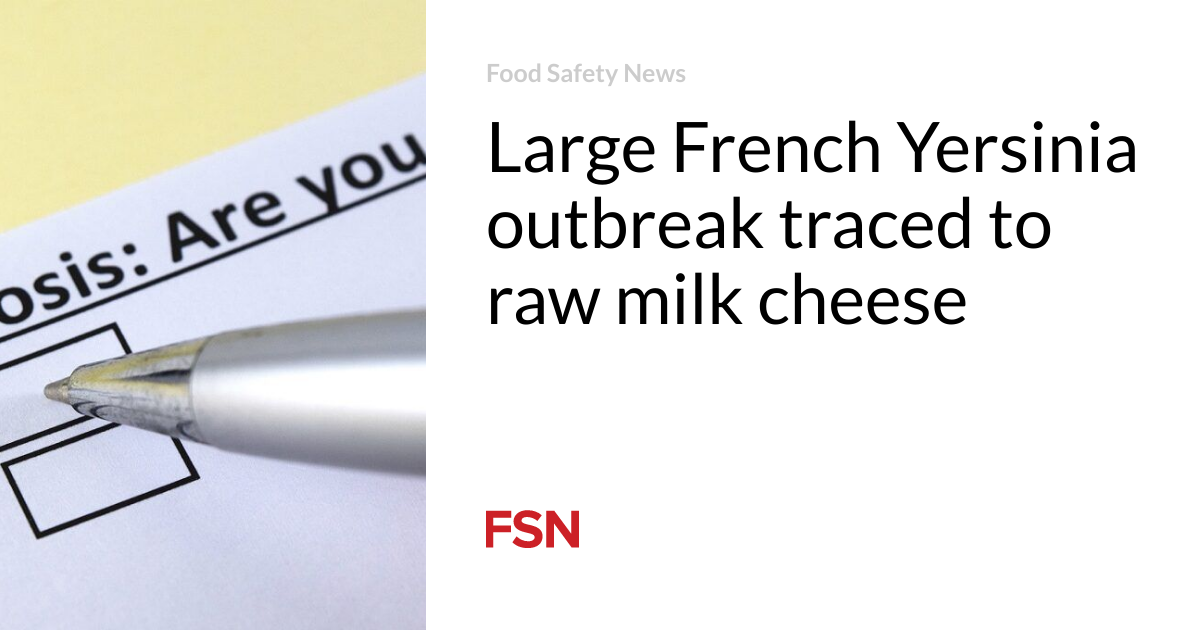A large Yersinia outbreak in France caused by raw milk cheese has prompted scientists to highlight the risks associated with unpasteurized dairy products.
In March 2024, French surveillance of yersiniosis picked up a cluster of Yersinia enterocolitica isolates, corresponding to bioserotype 2/O:9.
An outbreak investigation identified 175 confirmed patients with sampling dates between Jan. 27 and Aug. 23, 2024. Case interviews and traceback investigations pointed to unpasteurized soft goat’s milk cheese from one manufacturer as the source to the pathogen. Yersinia enterocolitica belonging to the same cluster as the case isolates was isolated from 23 samples from the producer and a goat farm supplying milk to the dairy.
Affected cheeses were recalled in France. A Rapid Alert System for Food and Feed (RASFF) report revealed cheese was distributed to 29 countries. An alert on Epipulse, a system run by the European Centre for Disease Prevention and Control (ECDC) identified seven other patients in Belgium, Luxembourg, and Norway.
Raw milk cheese link
Notification of yersiniosis is not mandatory in France but isolates are regularly sent on a voluntary basis by clinical microbiology labs to the Yersinia National Reference Laboratory for characterization.
In mid-March 2024, this lab notified Santé publique France about a cluster of six isolates of Yersinia enterocolitica. These isolates were from five patients with sampling dates between Jan. 27 and March 2. At the end of April, as the number of new patients identified weekly in the cluster had increased, an outbreak investigation was triggered.
According to a study in the journal Eurosurveillance, the 175 patients were aged between 1 and 85 and 98 were females. They resided in 12 of the 13 regions of mainland France, however, 73 cases lived in the Provence-Alpes-Côte d’Azur region, southeast France. One person was hospitalized.
Four patients mentioned consumption of an unpasteurized soft goat’s milk cheese from Provence-Alpes-Côte d’Azur, a food item not included in the questionnaire. When it was asked, 22 mentioned having consumed the cheese.
Tracing back to farm
An inspection at the manufacturer in June did not reveal any hygiene deficiencies or non-conformities with regulations. Thirty-nine samples were taken from 30 cheeses, eight surface swabs and one other environmental sample. Yersinia enterocolitica biotype 2 was found in four cheeses and one environmental sample.
The manufacturer received milk from eight dairy goat farms. These farms were inspected in July and samples were taken from 30 milk filters and one pair of boot swabs per farm. Yersinia enterocolitica was isolated from a pair of boot swabs from one farm.
A recall of all batches of unpasteurized soft goat’s milk cheese from the manufacturer occurred in July. Cheese production was resumed, after cleaning and disinfection, without using milk from the one positive farm. Sales were authorized after testing showed negative results.
Milk was pasteurized until cleaning of goats’ udders before milking was implemented, and microbiological analyses of milk filters and batches of raw goat’s milk cheese showed no contamination with pathogenic Yersinia enterocolitica. Authorization to resume raw milk distribution and raw milk cheese production at the implicated farm was granted in late August.
When told about the outbreak, the manufacturer included Yersinia enterocolitica in the panel of pathogenic bacteria to be tested: eleven samples tested negative by the lab of the cheese company. The method used was the foodproof Yersinia Detection Kit. Analyses by food safety authorities used ISO 10273:2017 and got several positive results.
Researchers said an advantage of the foodproof detection kit is the rapidity of results. However, they said, the low sensitivity for detection of Yersinia from cheese highlights the need for a reliable and rapid method to detect pathogenic Yersinia enterocolitica in the food industry.
(To sign up for a free subscription to Food Safety News, click here)
Source link
